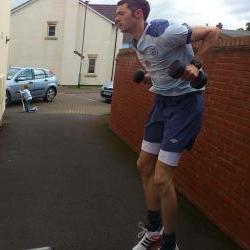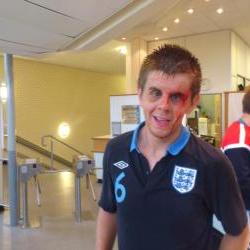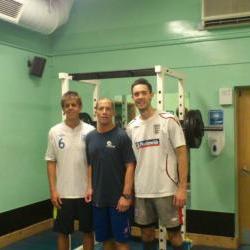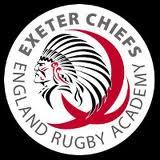Main Menu
Latest Blog Entry
User login
Blind Football: Training for the Paralympics
Blind Football tournament starts today in the Paralympics.
I have had the pleasure of working with 3 of the team: Dan James (Sighted Goalkeeper) Keryn Seal and Robin Williams in their build up to the tournament.
 Dan James is preparing for his second Olympics. 6 years ago Dan was on TASS funding and we were preparing for the Beijing.
Dan James is preparing for his second Olympics. 6 years ago Dan was on TASS funding and we were preparing for the Beijing.
We spent a lot of time working on his overall conditioning and introducing the strength work.
This time around, Dan was far more experienced as a player and in his knowledge of what it takes to prepare himself. He is just more mature now.
We have been working on getting him to move fast and explosively from various stationary positions, forwards, sideways and backwards.
This time we have linked the sessions directly to his goal keeping practice, and his mental preparation too.
Keryn Seal is also starting his 2nd Olympics, but I have only been working with him for 10 months.
As an experienced International, Keryn has had a lot of coaching, and is quite aware of how to prepare.
We have worked a lot on improving his technique of running, agility, and lifting weights. As a result he is now more efficient and runs faster (a lot faster).
Robin Williams has been training with me for 30 months now, on some TASS funding and more support from Exeter University.
He was more of a student than a student athlete when I first met him, unable to do a single press up or a squat and thought that drinking 7 pints of beer was a quiet night out.
 He had been told by one of his coaches that he “ran like Scooby Doo” but had been given no guidance or coaching on how to improve.
He had been told by one of his coaches that he “ran like Scooby Doo” but had been given no guidance or coaching on how to improve.
This has been a major project: getting Robin’s mindset into wanting to get better, realising what it takes to succeed at International level, getting him physically aware of what he is doing, and then finally trying to get him fit.
Over the last 6 months, and especially the last 3 months, Robin has shown a massive improvement as he has taken some responsibility for his own actions.
He now does his own programme without supervision, working on the little things, not just turning up to team sessions. We have also worked on his diet, looking at what works for him and getting the details right.
We have been developing his speed and speed endurance for football.
Does losing sight earlier make a difference?
Keryn lost his sight at 17, but was a sportsman before that. I can use examples from sports and life that he can interpret and use. Robin lost his sight at 3, and has no visual images or memories to draw upon.
He wants everything explained in detail, which is the polar opposite of how I normally coach. I want the athlete to solve problems themselves, so their body learns and becomes adaptable.
However, if you have no imprint or idea of what you are aiming for, then it is hard to learn. This is a constant work in progress between Robin and myself.
Lessons Learnt
- Set out the session or month goal clearly at the beginning.
- Getting the coaching cues right for blind players takes time, a common language has to be developed, especially when learning new skills.
- One cue at a time, be prepared to change and throw out what isn’t working.
- Blind players like moving to sound, so position yourself in space, otherwise they trip over obstacles!
- Patience, patience, patience: coach and players alike.
- Blend team sessions with individual ones.
- The daily activities of being a blind person, do hamper movement skills, so factor this into programming.
- Funding needs to be consistent, and player centred. When you have got a good coach/ athlete relationship that is working and getting results, that needs to be supported. The idea that transferring players across coaches, or not letting them know about funding for months at a time is not helpful (not just blind football, but all across sport, centralising is not always better).
- Pointing the way to go or holding out a water bottle to the player isn’t a good idea (every session I keep doing this!)
Coaching is an art, not a science.
 Preparing these players has been a challenging and rewarding experience, and it highlights the need for individual attention and coaching even in a team sport. It is easy to lump people together and send out generic programmes, but in order to improve, specific work needs to be done.
Preparing these players has been a challenging and rewarding experience, and it highlights the need for individual attention and coaching even in a team sport. It is easy to lump people together and send out generic programmes, but in order to improve, specific work needs to be done.
That is specific to the individual as a person, their body and then their position. Players are not lab specimens and should not be treated as science projects!
Gary Knight has been instrumental in their football development and coaches the players weekly. Thanks to Nick Beasant and his staff at Exeter University for helping support these players: facility access, funding (for Robin) and generally removing obstacles.
The boys were looking in great shape physically and mentally as I finished their last training session 10 days ago. Now is the time to put it into action. Good luck.
Read more if you would like to get strength and conditioning coaching in Devon
Client Testimonials
 Exeter Chiefs Rugby Academy
Exeter Chiefs Rugby Academy
James was in sole charge of fitness related matters, organising and implementing training programmes... also provided players with mentoring and advice on nutritional needs. He varied the programmes and was keen to keep ideas fresh and designed activities suitable to help young rugby player's progress. James was keen to put time into the thought process of his ideas and carry out to a very high standard.
More


Comments
[…] did talk to Vern about training blind athletes who have not had the opportunity to develop this gait cycle: it inhibits everything they are trying […]